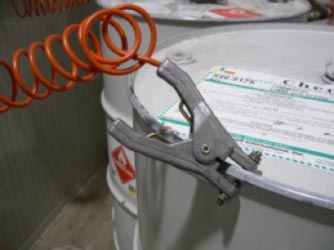Bonding and Grounding
Static electricity is generated by friction or by the quick separation of materials. Walking across a carpet generates static electricity. You can feel the charge as you touch a door handle.

The spark produced from this discharge usually contains enough energy to ignite flammable vapors if they are in concentrations that will sustain combustion. While static electricity cannot be eliminated, the potential for static charge buildup can be reduced through bonding and grounding.
If the static electricity builds up and can’t find its way to the ground, it discharges as a spark. Usually, the spark goes unnoticed. But in the presence of some substances and in certain atmospheres, it can set off an explosion.
Ways to Prevent a Static Electricity Explosion:
If your workplace has a potentially explosive or flammable atmosphere, you need to be thoroughly trained in all measures to deal with static. Here are four ways you can help prevent an explosion in your workplace:
- Check the connections on all bonding and grounding equipment before pouring flammable liquids. Check for loose bolts, frayed wires, and improperly attached clamps.
- Pour slowly to prevent turbulence.
- Use materials, equipment, and clothing that are less likely to generate and discharge electricity, such as cotton clothing rather than clothing made of synthetic fibers or special footwear that allows static electricity to be conducted to the ground.
- If you work with flammable liquids, review the safety data sheet (SDS) for instructions on safe handling and storage.
- If you work in or even occasionally visit any area where static electricity is a hazard, take these precautions very seriously. Workers are killed and workplaces are devastated every year in explosions caused by static electricity.
Attach flyer:STOTW_38_BondingGrounding.pdf (94.70 kb)

